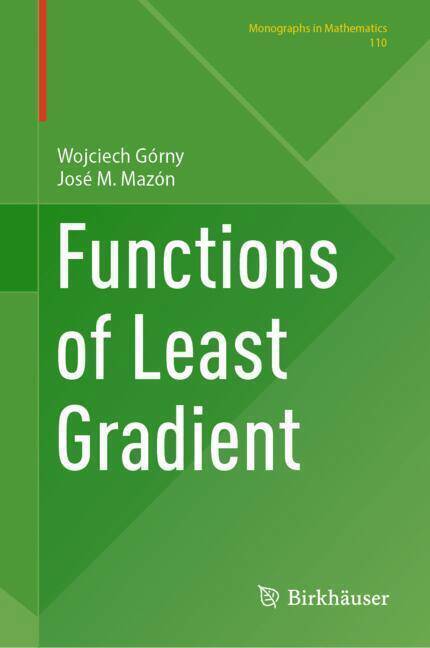
- Retrait gratuit dans votre magasin Club
- 7.000.000 titres dans notre catalogue
- Payer en toute sécurité
- Toujours un magasin près de chez vous
- Retrait gratuit dans votre magasin Club
- 7.000.0000 titres dans notre catalogue
- Payer en toute sécurité
- Toujours un magasin près de chez vous
Description
This book is devoted to the least gradient problem and its variants. The least gradient problem concerns minimization of the total variation of a function with prescribed values on the boundary of a Lipschitz domain. It is the model problem for studying minimization problems involving functionals with linear growth. Functions which solve the least gradient problem for their own boundary data, which arise naturally in the study of minimal surfaces, are called functions of least gradient.
The main part of the book is dedicated to presenting the recent advances in this theory. Among others are presented an Euler-Lagrange characterization of least gradient functions, an anisotropic counterpart of the least gradient problem motivated by an inverse problem in medical imaging, and state-of-the-art results concerning existence, regularity, and structure of solutions. Moreover, the authors present a surprising connection between the least gradient problem and the Monge-Kantorovich optimal transport problem and some of its consequences, and discuss formulations of the least gradient problem in the nonlocal and metric settings. Each chapter is followed by a discussion section concerning other research directions, generalizations of presented results, and presentation of some open problems.
The book is intended as an introduction to the theory of least gradient functions and a reference tool for a general audience in analysis and PDEs. The readers are assumed to have a basic understanding of functional analysis and partial differential equations. Apart from this, the text is self-contained, and the book ends with five appendices on functions of bounded variation, geometric measure theory, convex analysis, optimal transport, and analysis in metric spaces.
Spécifications
Parties prenantes
- Auteur(s) :
- Editeur:
Contenu
- Nombre de pages :
- 428
- Langue:
- Anglais
- Collection :
- Tome:
- n° 110
Caractéristiques
- EAN:
- 9783031518805
- Date de parution :
- 23-05-24
- Format:
- Livre relié
- Format numérique:
- Genaaid
- Dimensions :
- 156 mm x 234 mm
- Poids :
- 811 g

Les avis
Nous publions uniquement les avis qui respectent les conditions requises. Consultez nos conditions pour les avis.






